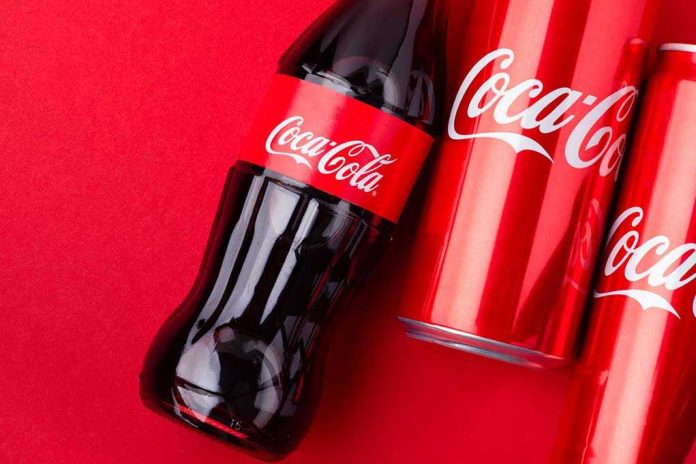
After years of frustration with artificial sweeteners and corporate indifference, Coca-Cola is finally bringing back real cane sugar to American shelves—thanks to relentless advocacy from President Trump.
Story Snapshot
- Coca-Cola launches a cane sugar version of its flagship soda in select U.S. markets, following direct urging from President Trump.
- The move marks a victory for consumers nostalgic for original flavors and for domestic cane sugar producers.
- Corporate America demonstrates responsiveness to both political leadership and grassroots demand.
- Limited domestic cane sugar supply constrains the initial rollout, with broader availability dependent on future market conditions.
Trump’s Influence Spurs a Corporate Course Correction
Donald Trump’s outspoken advocacy for “real cane sugar” Coca-Cola turned a long-simmering consumer concern into a national spotlight issue. In July 2025, Trump announced ongoing discussions with Coke executives, pressing them to reintroduce cane sugar in American products and reject decades of cost-driven reliance on high-fructose corn syrup. Within days, Coca-Cola confirmed plans for a new cane sugar version during its Q2 earnings call, directly linking the decision to mounting public and political pressure. This rare example of presidential influence over major corporate policy highlights the power of vocal leadership aligned with consumer sentiment.
For many Americans, this development is more than a product tweak—it represents a pushback against years of corporate decisions that prioritized cheap ingredients over quality and tradition. Trump’s direct involvement not only reflects widespread nostalgia for the original Coca-Cola taste but also underscores a shift in corporate America’s willingness to address conservative concerns, especially when amplified by the nation’s leader. The move is being celebrated by those who have long voiced skepticism about “woke” marketing and globalist supply chains that ignored American producers and consumer preferences.
Why Cane Sugar Matters: History and Policy
Coca-Cola’s switch to high-fructose corn syrup in the 1980s was driven by government tariffs on foreign sugar and subsidies for domestic corn, making corn syrup the cheaper alternative. For decades, American consumers seeking cane sugar Coke paid premium prices for imported Mexican bottles, with U.S. versions losing their original flavor profile. Trump’s push for cane sugar is not just about taste—it’s a stand for domestic agriculture, free markets, and the right of American consumers to demand better from iconic brands. The gradual rollout, announced for October 2025, is constrained by limited domestic cane sugar supply, a direct consequence of years of protectionist trade policies and corporate cost-cutting.
The move also signals a potential economic boost for American cane sugar producers, who have long struggled against the dominance of subsidized corn and restrictive import quotas. Retailers anticipate a surge in demand, especially among older consumers who remember the classic taste, and among families seeking products made with straightforward, natural ingredients—values increasingly embraced by conservatives tired of marketing gimmicks and artificial substitutes.
Wider Implications for Industry and Conservative Values
Coke’s decision could herald a broader industry trend away from high-fructose corn syrup, pressuring other beverage giants to reconsider ingredient sourcing in response to consumer and political demands. This shift aligns with conservative principles: supporting U.S. farmers, resisting globalist supply chains, and restoring authentic American products. The success of this initiative relies on the availability of domestic cane sugar, a factor that may limit expansion but also highlights the importance of sound agricultural policy and breaking the cycle of government interference that distorts markets.
For conservative families, this is a clear win—a return to tradition, a victory for common sense, and an example of how leadership that listens to the people can restore American values in everyday life. While critics argue the move may be more symbolic than transformative due to supply constraints, the fact remains: a major corporation responded to presidential advocacy rooted in consumer will, not activist agendas or government mandates. This restores faith that American voices, not bureaucrats or globalists, can still shape the marketplace.
Industry Reactions and Future Outlook
Industry experts note the significance of presidential influence in driving such a high-profile product change, with market analysts predicting increased competition and possible supply chain challenges. Some warn that the cane sugar rollout, while a positive step, faces real limitations as long as domestic supply remains tight—a problem rooted in decades of misguided trade and agricultural policy. Still, the enthusiasm from consumers and retailers signals that this is more than a passing fad; it is a test case for how American companies can win back trust by prioritizing authenticity over artificiality.
The rollout also puts pressure on other beverage and food companies to heed consumer demand for natural ingredients and responsible sourcing. Ultimately, Coca-Cola’s embrace of cane sugar under Trump’s urging stands as a testament to the enduring power of traditional values, market-driven reform, and the American consumer’s right to demand better—one bottle at a time.
Sources:
Coca-Cola officially rolls out cane sugar soda across US markets following Trump’s urging: report
Coca-Cola selling cane sugar Coke in US after Trump push




